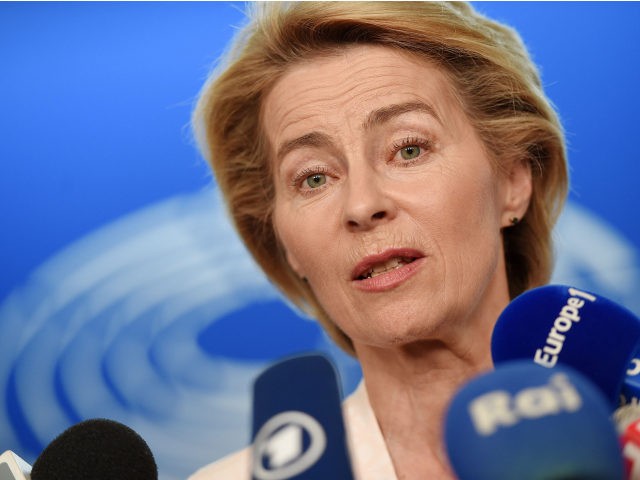After weeks of trying to apportion blame elsewhere and even threatening British drugs supplies, the head of the European Commission has admitted to the European Union’s vaccine failures.
Speaking to European media including France’s La Croix, European Commission President Ursula von der Leyen, however, continued to defend the EU’s vaccination strategy, which has resulted in a far smaller proportion of EU27 residents being vaccinated compared to in the UK. Rather than each European country seeking its own vaccine contracts, the Commission demanded that all contracts be centralised and handled by Brussels.
Brexit Britain opted out of the European Medicines Agency, freeing the nation to determine its own vaccination plans and take the kind of calculated risks that resulted in the UK becoming the first country in the Western world to approve for use a vaccine against coronavirus in December. The UK is now so confident of its drugs supply that it has ordered stockpiles for 2022.
Appearing to admit that the UK was right in its strategy, Mrs von der Leyen told the French newspaper: “Alone, a country can be a speedboat, while the EU is more like a ship.”
However, she was quick to imply that internal democratic structures were in part to blame for Brussels’ slow vaccine programming, saying: “Before concluding a contract with a pharmaceutical company, the 27 Member States had five full days to say whether they agreed or not. This naturally delays the process.”
The EU “should have thought more, in parallel, about mass production and the challenges it poses”, the head of the EU’s powerful executive arm admitted, adding that the bloc could have set up supply chains “earlier”.
The admission represents a major climbdown from the former German defence minister’s earlier positions.
The bloc’s vaccine fiasco began two weeks ago when both drugs company AstraZeneca and Pfizer announced delays to the first batches’ delivery due to production problems.
President von der Leyen and the Commission sought to blame the drugs companies, with countries like Italy threatening to sue AstraZeneca for breach of contract. The EU ordered a raid on one factory in Belgium, alleging that it had sent stock meant for the EU to the UK. Eurocrats also threatened to block the exports of vaccines contracted to be sold and shipped overseas, including to the UK, and incredulously demanded that doses made at AstraZeneca’s English plants ordered by the British government be sent to Europe to make up the shortfall.
The pharmaceutical company confronted the allegations, with its CEO Pascal Soriot telling European media that the UK was far ahead of the EU in terms of vaccinating populations because Brexit Britain had signed a deal three months before Brussels had. With the advanced contract and weeks to iron out manufacturing problems, British production was now the best out of all the company’s network, with Europe having the worst. Further, Mr Soriot claimed that while he had a firm contract with London, he could only offer the European bloc a “best-effort” to produce their doses on time due to the delays.
Media reports also revealed that while the Netherlands and a handful of other countries attempted to agree on their own arrangements with drugs firms like AstraZeneca, the EU’s demand to oversee all procurement contributed significantly to the delays, despite there being no material difference between those countries’ provisional agreement and that eventually agreed by Brussels.
Brexit leader Nigel Farage condemned the bloc, saying that it exposed how “nasty” and “vindictive” the EU could be. Mr Farage later said that the EU’s vaccine failures spelt the beginning of the end of the European Project, and said that if it taught the Europeans anything, it is that European countries should also leave the Union so that they are free to make their own, often more rapid, decisions on crises.
Criticism for the Commission and its president came not just from the UK’s chief Eurosceptic, but also from Britain’s Remain-backing media and European newspapers. Germany’s Bild called the fiasco “the best advertisement for Brexit”. While Die Welt, another German newspaper, praised “vaccination masters” Donald Trump and Benjamin Netanyahu, while “Brexit Boris laid the foundation for vaccination success”.
Von der Leyen came under massive criticism, however, when she imposed and then rescinded a hard border on the island of Ireland to stop the export of vaccines from EU member-state the Republic of Ireland to the UK’s Northern Ireland, which could have threatened the Belfast Agreement.
“She needs to go. Now,” one European diplomat said in response, adding: “She told f—— no one, after four years of tedious skullduggery over the [Irish] backstop. Surely the commission could have thought of the optics?”
Mrs von der Leyen told La Croix that she “regretted” triggering Article 16 of the Northern Irish Protocol in the Brexit deal, and seemed to imply that of the 1,500 decisions she made in a very short time, one such as significant and sensitive as that had simply slipped through.
“We shouldn’t even have thought about Article 16! I regret it. The Commission made around 1,500 decisions in a short period of time and almost 900 emergency decisions under very high pressure. I admit it: it’s a never-ending task to communicate with all parties,” she said.
However, despite admitting the slow nature of EU procurement, which takes power out of the hands of individuals states and is resulting in the delay to ending of lockdowns for hundreds of millions of Europeans, the German politician maintained: “I am absolutely convinced that the European approach is the right one.”

COMMENTS
Please let us know if you're having issues with commenting.